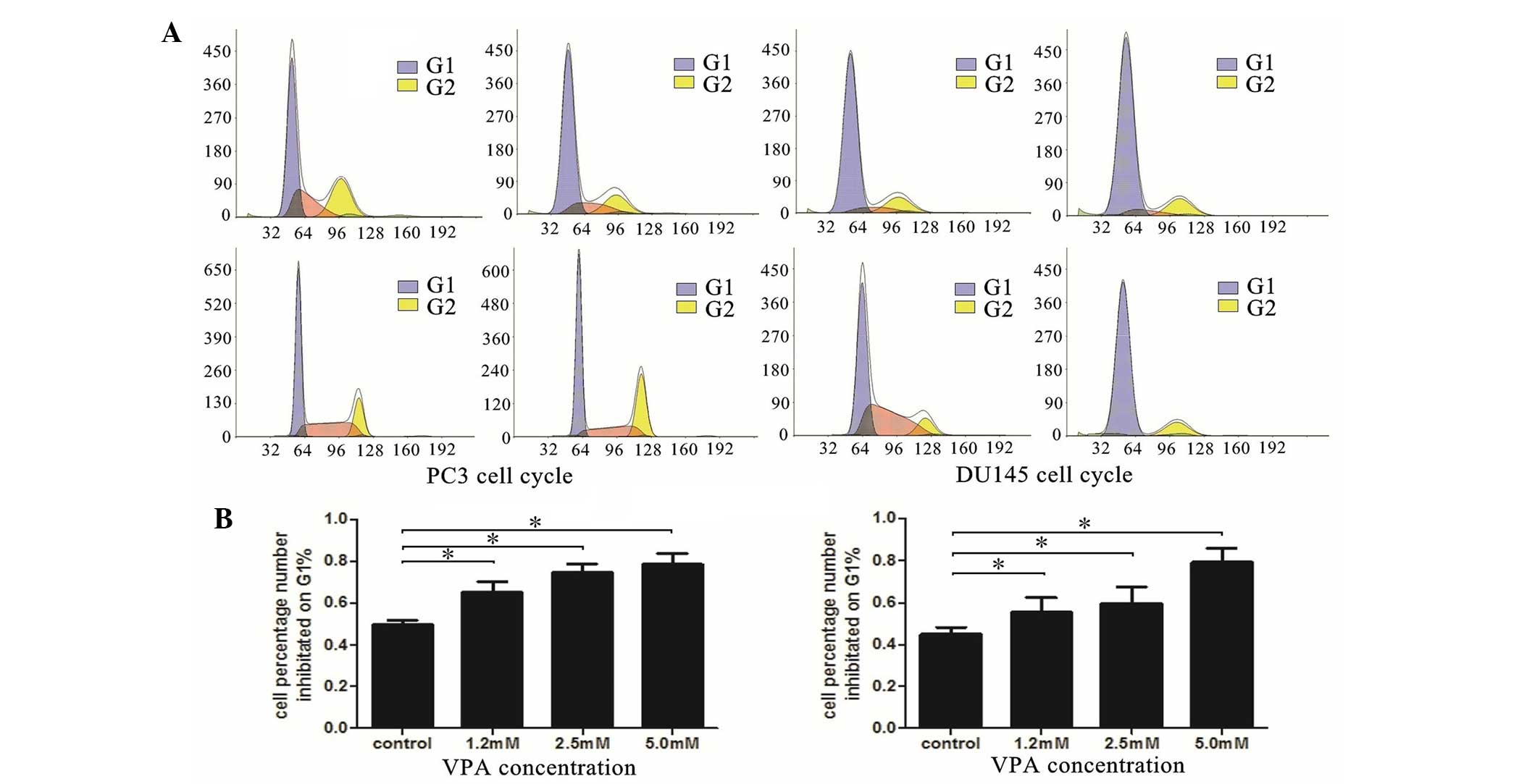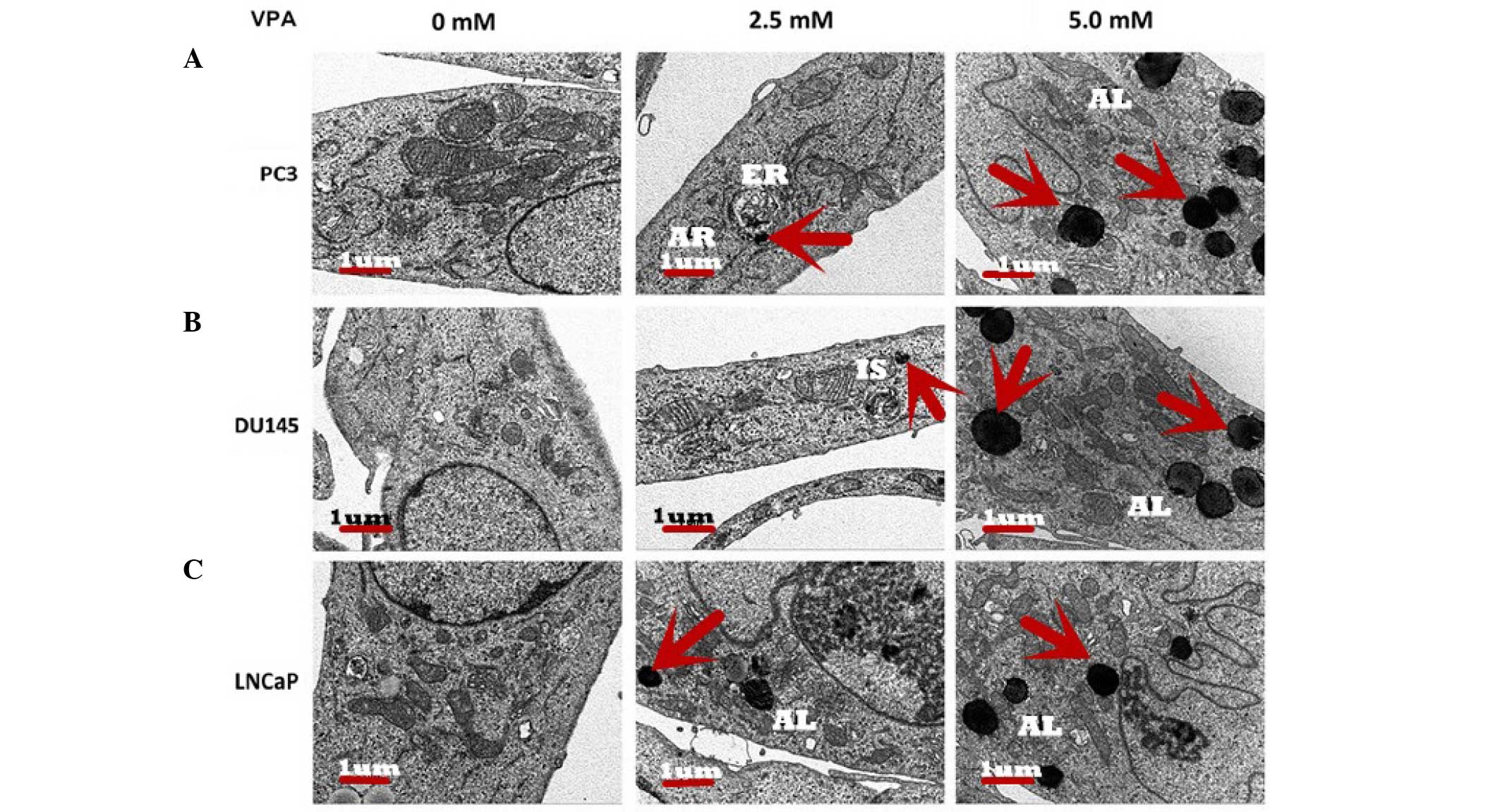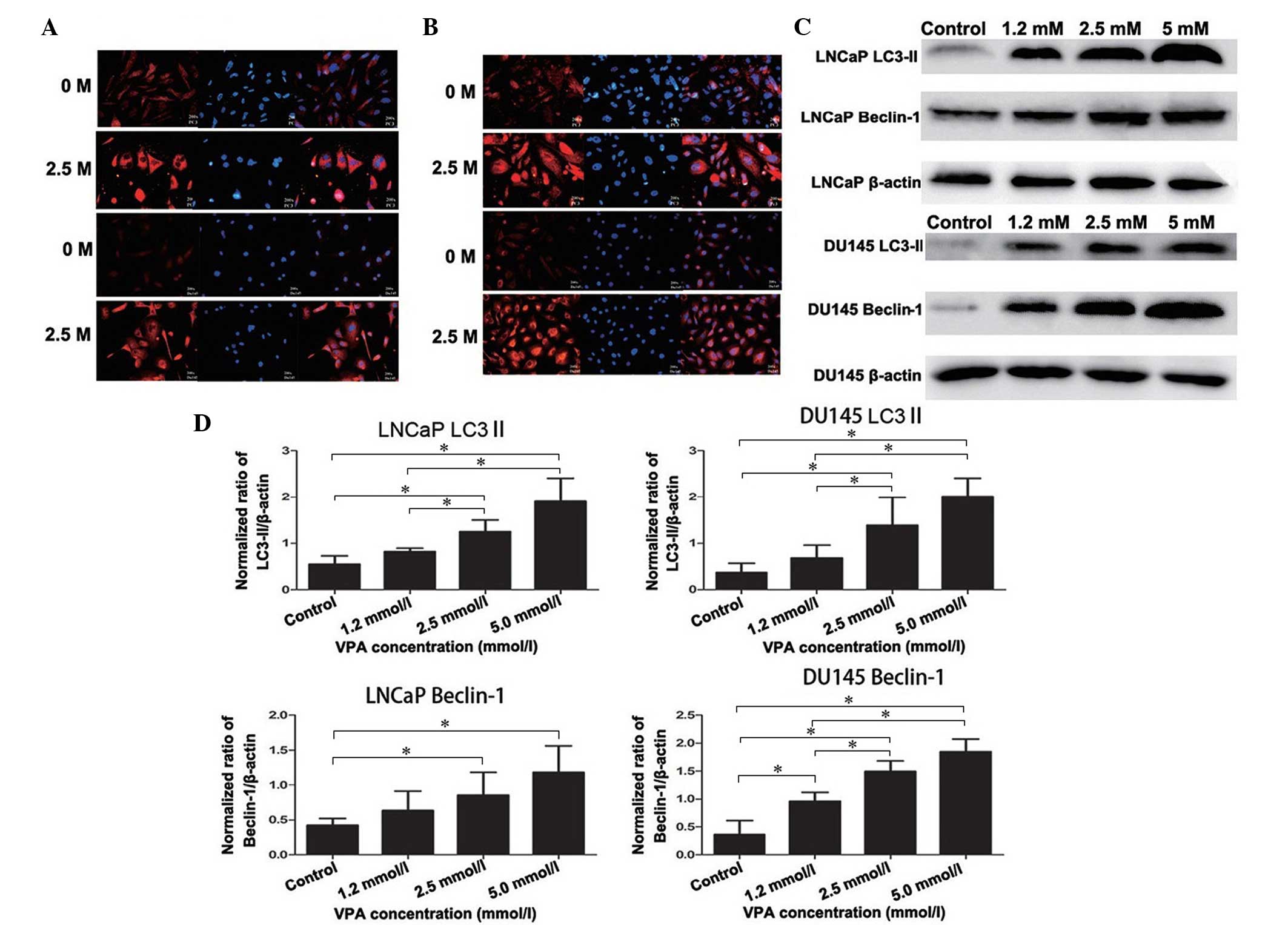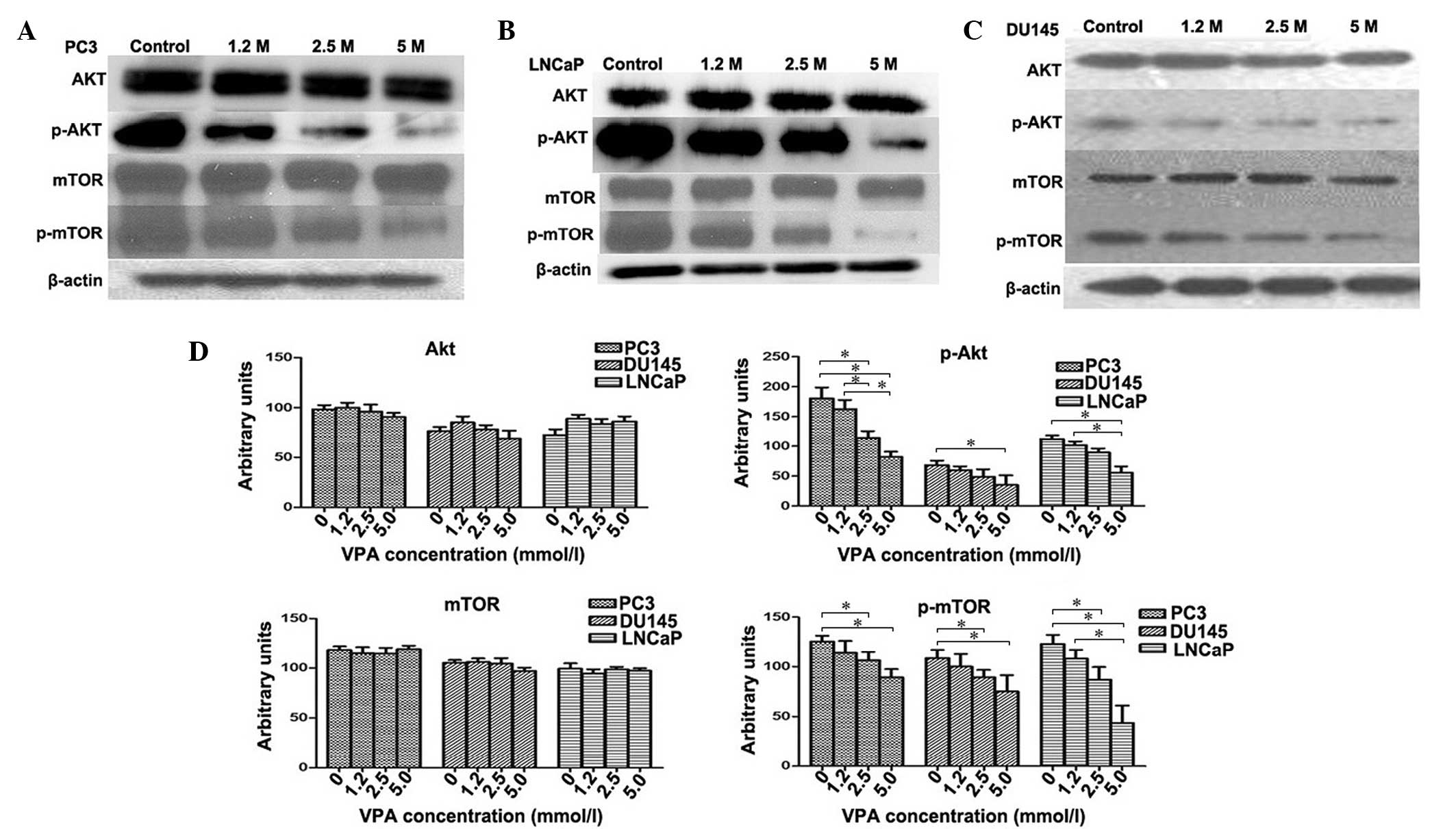|
1
|
Antonarakis ES, Armstrong AJ, Dehm SM and
Luo J: Androgen receptor variant-driven prostate cancer: Clinical
implications and therapeutic targeting. Prostate Cancer Prostatic
Dis. May 17–2016.(Epub ahead of print). View Article : Google Scholar
|
|
2
|
Siegel RL, Miller KD and Jemal A: Cancer
statistics, 2016. CA Cancer J Clin. 66:7–30. 2016. View Article : Google Scholar : PubMed/NCBI
|
|
3
|
Jiang W, Zheng Y, Huang Z, Wang M, Zhang
Y, Wang Z, Jin X and Xia Q: Role of SMAD4 in the mechanism of
valproic acid's inhibitory effect on prostate cancer cell
invasiveness. Int Urol Nephrol. 46:941–946. 2014. View Article : Google Scholar : PubMed/NCBI
|
|
4
|
Hegde M, Mantelingu K, Pandey M,
Pavankumar CS, Rangappa KS and Raghavan SC: Combinatorial study of
a novel poly (ADP-ribose) polymerase inhibitor and an HDAC
inhibitor, SAHA, in leukemic cell lines. Target Oncol. May
17–2016.(Epub ahead of print). View Article : Google Scholar : PubMed/NCBI
|
|
5
|
Barneda-Zahonero B and Parra M: Histone
deacetylases and cancer. Mol Oncol. 6:579–589. 2012. View Article : Google Scholar : PubMed/NCBI
|
|
6
|
Giannini G, Cabri W, Fattorusso C and
Rodriquez M: Histone deacetylase inhibitors in the treatment of
cancer: Overview and perspectives. Future Med Chem. 4:1439–1460.
2012. View Article : Google Scholar : PubMed/NCBI
|
|
7
|
Chateauvieux S, Morceau F, Dicato M and
Diederich M: Molecular and therapeutic potential and toxicity of
valproic acid. J Biomed Biotechnol. 2010:4793642010. View Article : Google Scholar : PubMed/NCBI
|
|
8
|
Xia Q, Sung J, Chowdhury W, Chen CL, Höti
N, Shabbeer S, Carducci M and Rodriguez R: Chronic administration
of valproic acid inhibits prostate cancer cell growth in vitro and
in vivo. Cancer Res. 66:7237–7244. 2006. View Article : Google Scholar : PubMed/NCBI
|
|
9
|
Gao D, Xia Q, Lv J and Zhang H: Chronic
administration of valproic acid inhibits PC3 cell growth by
suppressing tumor angiogenesis in vivo. Int J Urol. 14:838–845.
2007. View Article : Google Scholar : PubMed/NCBI
|
|
10
|
Huang ZX, Jin XB, Wang MW, Zhang YN, Zheng
Y and Xia QH: Effect of valproic acid on autophagy in prostate
cancer PC3 cells. Shandong Da Xue Xue Bao. 49:44–47. 2011.(In
Chinese).
|
|
11
|
Nho RS and Hergert P: IPF fibroblasts are
desensitized to type I collagen matrix-induced cell death by
suppressing low autophagy via aberrant Akt/mTOR kinases. PLoS One.
9:e946162014. View Article : Google Scholar : PubMed/NCBI
|
|
12
|
Lauritzen I, Pardossi-Piquard R, Bourgeois
A, Pagnotta S, Biferi MG, Barkats M, Lacor P, Klein W, Bauer C and
Checler F: Intraneuronal aggregation of the β-CTF fragment of APP
(C99) induces Aβ-independent lysosomal-autophagic pathology. Acta
Neuropathol. Apr 30–2016.(Epub ahead of print). View Article : Google Scholar : PubMed/NCBI
|
|
13
|
Goode A, Butler K, Long J, Cavey J, Scott
D, Shaw B, Sollenberger J, Gell C, Johansen T, Oldham NJ, et al:
Defective recognition of LC3B by mutant SQSTM1/p62 implicates
impairment of autophagy as a pathogenic mechanism in ALS-FTLD.
Autophagy. May 9–2016.(Epub ahead of print). View Article : Google Scholar : PubMed/NCBI
|
|
14
|
Castagna C, Merighi A and Lossi L: Cell
death and neurodegeneration in the postnatal development of
cerebellar vermis in normal and Reeler mice. Ann Anat. Feb
28–2016.(Epub ahead of print). View Article : Google Scholar : PubMed/NCBI
|
|
15
|
Zhao X, Yang W, Shi C, Ma W, Liu J, Wang Y
and Jiang G: The G1 phase arrest and apoptosis by intrinsic pathway
induced by valproic acid inhibit proliferation of BGC-823 gastric
carcinoma cells. Tumour Biol. 32:335–346. 2011. View Article : Google Scholar : PubMed/NCBI
|
|
16
|
Kouidhi S, Noman MZ, Kieda C, Elgaaied AB
and Chouaib S: Intrinsic and tumor microenvironment-induced
metabolism adaptations of T cells and impact on their
differentiation and function. Front Immunol. 7:1142016. View Article : Google Scholar : PubMed/NCBI
|
|
17
|
Chen Y, Liu XR, Yin YQ, Lee CJ, Wang FT,
Liu HQ, Wu XT and Liu J: Unravelling the multifaceted roles of Atg
proteins to improve cancer therapy. Cell Prolif. 47:105–112. 2014.
View Article : Google Scholar : PubMed/NCBI
|
|
18
|
Damaskos C, Karatzas T, Nikolidakis L,
Kostakis ID, Karamaroudis S, Boutsikos G, Damaskou Z, Kostakis A
and Kouraklis G: Histone deacetylase (HDAC) inhibitors: Current
evidence for therapeutic activities in pancreatic cancer.
Anticancer Res. 35:3129–3135. 2015.PubMed/NCBI
|
|
19
|
Carafa V, Miceli M, Altucci L and Nebbioso
A: Histone deacetylase inhibitors: A patent review (2009-2011).
Expert Opin Ther Pat. 23:1–17. 2013. View Article : Google Scholar : PubMed/NCBI
|
|
20
|
Lee JE and Kim JH: Valproic acid inhibits
the invasion of PC3 prostate cancer cells by upregulating the
metastasis suppressor protein NDRG1. Genet Mol Biol. 38:527–533.
2015. View Article : Google Scholar : PubMed/NCBI
|
|
21
|
Nagai H, Fujioka-Kobayashi M, Ohe G, Hara
K, Takamaru N, Uchida D, Tamatani T, Fujisawa K and Miyamoto Y:
Antitumour effect of valproic acid against salivary gland cancer in
vitro and in vivo. Oncol Rep. 31:1453–1458. 2014.PubMed/NCBI
|
|
22
|
Cerella C, Teiten MH, Radogna F, Dicato M
and Diederich M: From nature to bedside: Pro-survival and cell
death mechanisms as therapeutic targets in cancer treatment.
Biotechnol Adv. 32:1111–1122. 2014. View Article : Google Scholar : PubMed/NCBI
|
|
23
|
Natsumeda M, Aoki H, Miyahara H, Yajima N,
Uzuka T, Toyoshima Y, Kakita A, Takahashi H and Fujii Y: Induction
of autophagy in temozolomide treated malignant gliomas.
Neuropathology. 31:486–493. 2011. View Article : Google Scholar : PubMed/NCBI
|
|
24
|
Chen X, Wong JY, Wong P and Radany EH:
Low-dose valproic acid enhances radiosensitivity of prostate cancer
through acetylated p53-dependent modulation of mitochondrial
membrane potential and apoptosis. Mol Cancer Res. 9:448–461. 2011.
View Article : Google Scholar : PubMed/NCBI
|
|
25
|
Mari M, Tooze SA and Reggiori F: The
puzzling origin of the autophagosomal membrane. F1000 Biol Rep.
3:252011. View
Article : Google Scholar : PubMed/NCBI
|
|
26
|
Levine B and Kroemer G: Autophagy in
aging, disease and death: The true identity of a cell death
impostor. Cell Death Differ. 16:1–2. 2009. View Article : Google Scholar : PubMed/NCBI
|
|
27
|
Talaber G, Miklossy G, Oaks Z, Liu Y,
Tooze SA, Chudakov DM, Banki K and Perl A: HRES-1/Rab4 promotes the
formation of LC3(+) autophagosomes and the accumulation of
mitochondria during autophagy. PLoS One. 9:e843922014. View Article : Google Scholar : PubMed/NCBI
|
|
28
|
Lai SC and Devenish RJ: LC3-associated
phagocytosis (LAP): Connections with host autophagy. Cells.
1:396–408. 2012. View Article : Google Scholar : PubMed/NCBI
|
|
29
|
Palmisano NJ and Meléndez A: Detection of
autophagy in Caenorhabditis elegans by western blotting
analysis of LGG-1. Cold Spring Harb Protoc.
2016:pdb.prot0865122016. View Article : Google Scholar : PubMed/NCBI
|
|
30
|
Klionsky DJ, Abdalla FC, Abeliovich H,
Abraham RT, Acevedo-Arozena A, Adeli K, Agholme L, Agnello M,
Agostinis P, Aguirre-Ghiso JA, et al: Guidelines for the use and
interpretation of assays for monitoring autophagy. Autophagy.
8:445–544. 2012. View Article : Google Scholar : PubMed/NCBI
|
|
31
|
Lv ZQ, Han JJ, Liu YQ, Wang LL, Tang QL,
Sun Q and Li HG: Expression of beclin 1 in non-small cell lung
cancer: An immunohistochemical study. Clin Respir J. 9:359–365.
2015. View Article : Google Scholar : PubMed/NCBI
|
|
32
|
Liang C, Feng P, Ku B, Dotan I, Canaani D,
Oh BH and Jung JU: Autophagic and tumour suppressor activity of a
novel Beclin1-binding protein UVRAG. Nat Cell Biol. 8:688–699.
2006. View
Article : Google Scholar : PubMed/NCBI
|
|
33
|
Li L, Chen X and Gu H: The signaling
involving in autophagy machinery in keratinocytes and therapeutic
approaches for skin diseases. Oncotarget. May 12–2016.(Epub ahead
of print).
|
|
34
|
Taneike M, Nishida K, Omiya S,
Zarrinpashneh E, Misaka T, Kitazume-Taneike R, Austin R, Takaoka M,
Yamaguchi O, Gambello MJ, et al: mTOR hyperactivation by ablation
of tuberous sclerosis complex 2 in the mouse heart induces cardiac
dysfunction with the increased number of small mitochondria
mediated through the down-regulation of autophagy. PLoS One.
11:e01526282016. View Article : Google Scholar : PubMed/NCBI
|
|
35
|
Riquelme I, Tapia O, Espinoza JA, Leal P,
Buchegger K, Sandoval A, Bizama C, Araya JC, Peek RM and Roa JC:
The gene expression status of the PI3K/AKT/mTOR pathway in Gastric
Cancer Tissues and cell lines. Pathol Oncol Res. May 7–2016.(Epub
ahead of print). View Article : Google Scholar : PubMed/NCBI
|
|
36
|
Feng Y, Backues SK, Baba M, Heo JM, Harper
JW and Klionsky DJ: Phosphorylation of Atg9 regulates movement to
the phagophore assembly site and the rate of autophagosome
formation. Autophagy. 12:648–658. 2016. View Article : Google Scholar : PubMed/NCBI
|
|
37
|
Malfitano AM, Laezza C, Galgani M,
Matarese G, D'Alessandro A, Gazzerro P and Bifulco M: The CB1
receptor antagonist rimonabant controls cell viability and ascitic
tumour growth in mice. Pharmacol Res. 65:365–371. 2012. View Article : Google Scholar : PubMed/NCBI
|


















